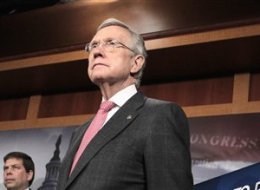WASHINGTON -- Democrats outraged by the legal rulings that allowed unlimited corporate contributions to pour into the 2010 elections have taken two paths. Some are still fighting against a situation they see as too corrupting to let stand. Others are taking the "if you can't beat 'em, join 'em" approach.
Senate Leader Harry Reid (D-Nev.) officially threw in his hat with the joiners on Wednesday, sending out an email for a Democratic Super PAC that is able to accept unlimited funds from donors, including corporations. The solicitation was first reported by the Center for Responsive Politics' OpenSecrets blog.
Reid carefully couched his pitch for Majority PAC to avoid the moral and possibly legal ramifications involved with a member of Congress directly soliciting unlimited contributions -- widely considered one of the last official no-no's remaining after the Supreme Court's evisceration of most post-Watergate campaign finance reforms.
A postscript in a box all the way at the bottom of his email says: "Senator Reid is only asking for a donation of up to $5,000 from individuals or federal PACs. He is not asking for funds from corporations, labor unions, or other federally prohibited sources."
But the only reason for Majority PAC's existence is to solicit and accept unlimited contributions: A normal PAC could accept the kind of money Reid was ostensibly asking for.
Indeed, as Reid explained in his email, the justification for Majority PAC is that "there is no greater threat to our majority than the deep pockets and nasty tactics of Karl Rove, the Koch Brothers, and their network of corporate-backed special interest groups."
Conservatives very effectively used Super PACs and even more controversial 501(c)(4) groups to savage Democratic candidates in the 2010 election cycle.
Reid's email may be surprising, coming as close as he did to soliciting unlimited funds, but his support for the group was already widely assumed. Its leadership includes two of his top former aides, Susan McCue and Rebecca Lambe, much like a similar group, Priorities USA, is led by two former White House aides.
"Majority PAC is made up of some of the smartest, toughest Democrats in the country," Reid wrote.
The ban on the solicitation of unlimited funds by members of Congress is one of the few provisions left standing from the 2002 bipartisan campaign finance bill known as McCain-Feingold, after the Arizona Republican and Wisconsin Democrat who championed it. Its rules for what is known as "soft money" prohibit federal officeholders and candidates from soliciting or directing any funds in connection with a federal election "unless the funds are subject to the limitations, prohibitions and reporting requirements” of the law. Ergo Reid's postscript.
Even that restriction is now under attack. Republican National Committee member and arch-nemesis of campaign finance laws James Bopp announced in May that he was forming the Republican Super PAC, with the explicit intention of having members of Congress solicit unlimited contributions for it. He claimed that as long as members aren't involved in precisely how the money is spent once it's been received, that would still count as an "independent" expenditure.
The reformers at Democracy 21 and the Campaign Legal Center responded by sending out a letter to all members of Congress warning them that, in their view, such action remains illegal.
Two Democratic Super PACs -- including Majority PAC -- responded by requesting an official advisory opinion from the Federal Election Commission. They said that they'd do whatever the Republicans were doing, as long as the FEC said it was OK.
Opposing massive campaign spending has historically been a central tenet of the Democratic Party. In his 2010 State of the Union Address, President Barack Obama memorably excoriated the justices of the Supreme Court seated before him for reversing "a century of law that I believe will open the floodgates for special interests -- including foreign corporations -- to spend without limit in our elections. I don't think American elections should be bankrolled by America's most powerful interests, or worse, by foreign entities."
Reid's caveat spared him the wrath of campaign reformers on Wednesday. But just last week, as The Huffington Post's Amanda Terkel reported from the annual Netroots Nation conference, former Wisconsin Sen. Russ Feingold issued Democrats a dire warning.
"Creating those kinds of super PACs for Democrats is wrong. It is not something we should do. I disagree," Feingold said. "We'll lose our soul when it comes to the issue of corporate domination. People will see us as weak. People will see us as corporate-lite. We'll gut our message. I think it's not just wrong, I think it's a dumb strategy. It's dumb because people will not believe us if we do this."
Reid Majority PAC Solicitation


First Posted: 06/22/11 05:53 PM ET Updated: 06/22/11 06:02 PM ET